
Source: WSJ
There have been many many reports of what it’s like at the earthquake-affected areas, and now there is a growing number of reports coming from inside the nuclear evacuation zone. According to Google News, the Global Post, the Telegraph, and CNN have reports, and a Japanese team recently posted a video of their trip. Here is what the Wall Street Journal had to offer:
Eerie Hush Descends on Japan’s Nuclear Zone
FUTABA, Japan—In the Coin Laundry, a dryer is still loaded with clothes: an orange hooded sweatshirt, a green worker’s vest and two pairs of jeans, damp and smelling of mildew.
At Joe’s Man restaurant near the train station, a menu lists the lunch specials, starting with bacon-and-eggplant pasta in a tomato-cream sauce. A flyer on the open doors of the Nishio clothes shop promotes a five-day “inventory clearance” sale. Over the road that runs through the town center, a white-and-blue sign proclaims: “Understanding Nuclear Power Correctly Will Lead to an Abundant Life.”
But life, by and large, is what is absent in this town, just a few miles away from the troubled Fukushima Daiichi nuclear plant.
A little further down the reporters describe an interesting exchange after explaining that the zone isn’t illegal to enter but strongly discouraged:
“What are you doing here?” a fireman asked a reporter walking in the street. From the passenger seat, another firefighter held up a radiation monitor. “You are not supposed to be here. It’s dangerous,” he said. “Please leave soon.”
To me, if there are enough reporters on the ground that they are running into each other in an evacuation zone, something is very wrong here. Whatever value there is to tell the story of the evacuees has been eclipsed by the reporters’ attraction to a sexy location with post-apocalyptic trappings. These people are not looking to provide useful information for a discerning public. They are just entertainers hoping to sell an interesting story to the folks back home.
Most of the time media as entertainment is fine and more or less harmless. The tradition of Westerners reporting back on exotic travels goes back at least to Marco Polo, and it’s only natural for people to have a voyeuristic interest in world events. I’ll even allow that there may simply be no other good way to get digestible information about other countries. It’s just that from the perspective of someone living in Japan with a stake in the quake’s aftermath, seeing these kinds of reports is frustrating and makes me think they’re exploiting a tragedy.
After the earthquake, a lot of foreign residents of Japan received panicked messages from their relatives and friends back home, myself included. In my case, I had to tell my mom to stop watching CNN and turn to more reliable sources like NHK World. Since she didn’t have that on cable, she ended up turning to CCTV9, the international version of China’s state-run TV, because it had much more straightforward, facts-based reports. Other relatives also contacted me, some telling me to consider leaving. One conspiracy theorist relative told me to check the Drudge Report to get “the real story.”
Normally, average people are served well enough by whatever media they choose to access because it never affects their daily lives. People can read well-written articles in The Economist that might be wildly inaccurate because hey, who’s going to know the difference unless you’re actually from the country they’re writing about? It’s all just entertainment for the commute. Sadly, there’s no separation between the entertainment media and where you should turn when there’s real news.

